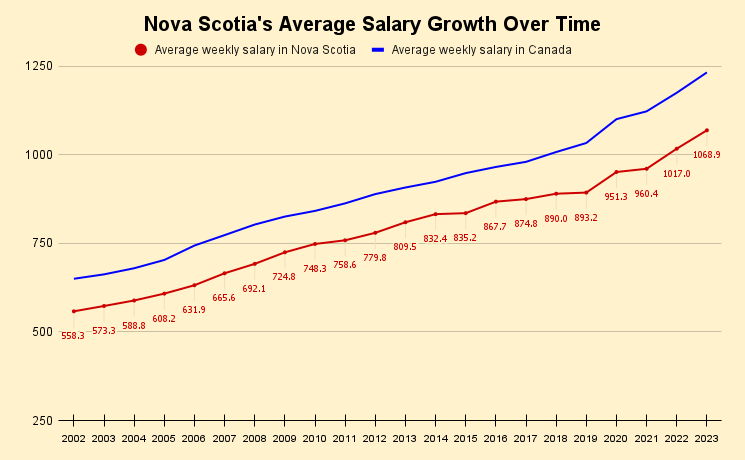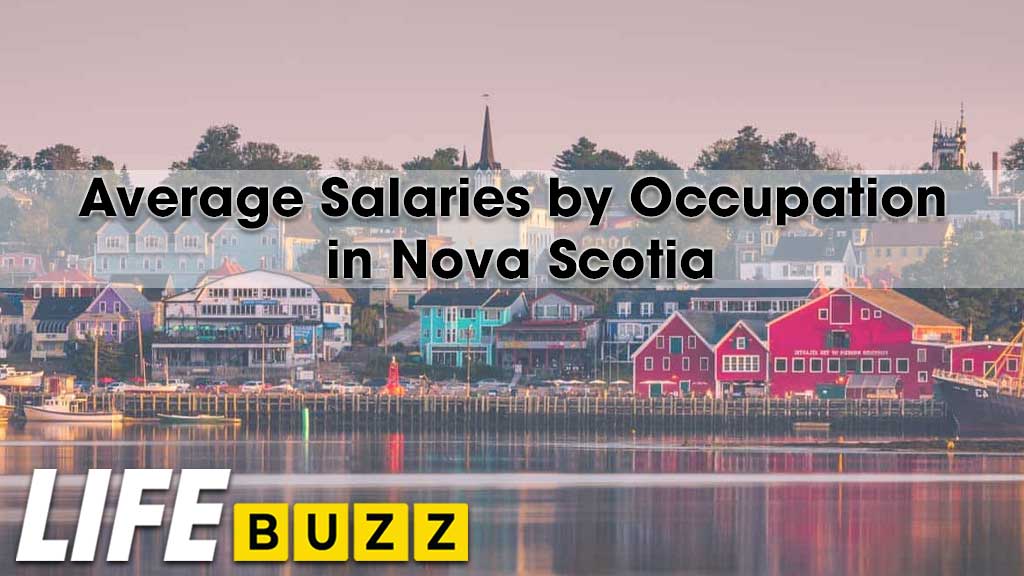Nova Scotia, located on Canada’s east coast, is renowned for its natural beauty, maritime culture, and growing economy. The job market in Nova Scotia offers opportunities across various industries and occupations.
While the average salary in Canada provides a valuable benchmark for understanding national earnings, this article focuses on Nova Scotia’s salary landscape. Wages in the province can vary significantly depending on your chosen career path and location.
By examining average wage data and trends, job seekers can gain valuable insight into earning potential in Nova Scotia.
What is the Average Salary in Nova Scotia?
According to Statistics Canada, the average weekly wage for all employees in Nova Scotia in 2024 was $1,139.62. This equates to approximately $55,583 annually, assuming a 52-week work year.
To compare, the average weekly wage across Canada was $1,290.30 in 2024. This is 15% higher than the Nova Scotia average every week.
The major takeaway is that the average salary in Nova Scotia tends to be lower than the Canadian norm. However, certain occupations pay wages on par or above national levels, which will be explored later in this article.
Nova Scotia’s Average Salary Growth Over Time
Analyzing historical data on wage progression in Nova Scotia provides useful context on how salaries have changed over the past two decades.
Statistics Canada data reveals that from 2002 to 2024, the overall average weekly wage for all employees in Nova Scotia grew from $558.32 to $1,139.62. This represents a total increase of 104% over the 22-year period.

Breaking it down further:
- In 2002, the average weekly wage in Nova Scotia was $558.32.
- By 2010, it had risen to $748.31, reflecting an increase of 34% over 8 years.
- In 2015, the weekly average reached $835.23, up 18% from 2010.
- The average weekly wage surpassed $1,000 for the first time in 2022, hitting $1,017.02 that year.
- In 2023, the latest data available, the weekly average came in at $1,068.92, representing a 5% increase from 2022.
- In 2024, the weekly average in Nova Scotia came in at $1,139.62.
For comparison, the average weekly wage across Canada went from $650.12 in 2002 to $1,290.30 in 2024. This equals a 98.47% total increase nationally over the 22 years.
While Nova Scotia’s 104% wage growth outpaced the 98.47% national rise, its weekly wages remain below the Canadian average today.
Two decades of wage data analysis show steady but uneven growth in Nova Scotia’s salaries. The increase has accelerated in recent years, but it still lags behind the country overall. These long-term trends provide helpful context for job seekers and employers.
What are the Average Salaries by Occupation in Nova Scotia?

Examining average wages across Nova Scotia’s major occupational categories provides helpful benchmarks by industry and job type.
- Management occupations have the highest overall salaries, averaging $2,071.96 weekly. Legislative and senior managers are the top earners at $2,671.21 weekly. Specialized middle managers earn $2,199.99 weekly.
- Natural and applied science professionals earn an average of $1,611.90 weekly. Engineers, architects, mathematicians, and physical scientists comprise this well-compensated group.
- Healthcare professionals earn an average weekly salary of $1,280.06. Medical doctor salaries range from $199,325 for family physicians to $398,206 for specialists.
- Education, law, and social/community service professionals earn $1,393.09 weekly or $72,440 annually. Judges and lawyers are particularly well-paid.
- Financial and business service professionals average $1,412.89 weekly or $73,470 annually. This includes accountants, financial analysts, human resource professionals and more.
- In technical trades, industrial electricians earn $1,333.14 weekly or $69,323 annually on average. Power engineers average $1,360.60 weekly or $70,751 annually.
- Administrative and financial supervisors make $1,045.57 weekly or $54,370 annually on average. Office administrators and executive assistants fall under this category.
- Sales and service supervisors earn approximately $872.75 weekly or $45,383 annually. Retail sales supervisors are included here.
- Transport and heavy equipment operators earn an average of $913.12 to $1,139.82 per week or $47,482 to $59,270 per year. Crane operators, truck drivers, and railway engineers comprise this category.
In summary, Nova Scotia offers strong salaries in a variety of white-collar professional and management roles, as well as certain skilled trades.
Source: Statistics Canada. Table 14-10-0417-01 Employee wages by occupation, annual
What are the Highest and lowest-paying jobs in Nova Scotia?

Nova Scotia offers a wide range of careers with varying salary levels. Specific occupations can provide insight into the province’s highest—and lowest-paying professions.
According to data from Job Bank, twelve of the highest-paying jobs in Nova Scotia are:
| Job | Average Hourly Wage ($) |
|---|---|
| Judges | 396,700 |
| Specialists in surgery | 417,023 |
| Specialists in clinical and laboratory medicine | 210,368 |
| Dentist | 126,000 |
| General practitioners and family physicians | 187,135 |
| Optometrists | 85,000 |
| Chiropractors | 65,000 |
| Massage therapists | 33,425 |
| Musicians and singers | 33,425 |
| Real estate agents and salespersons | 51,600 |
| Home building and renovation managers | 44,400 |
| Legislators | 94,000 |
On the other hand, some jobs in Nova Scotia offer lower wages, especially in the retail, food service, and caregiving sectors:
| Job | Average Hourly Salary ($) |
|---|---|
| Cashiers | 15.70 |
| Service Attendants, Kitchen Helpers, other service support occupations | 15.70 |
| Food and Beverage Servers | 15.70 |
| Dry cleaning, laundry and related occupations | 15.70 |
| Store Shelf Stockers, Clerks, and Order Fillers | 15.70 |
| Other Sales-Related Occupations | 15.70 |
| Bakers | 15.70 |
| Pet groomers and animal care workers | 15.70 |
| Light Duty Cleaners | 17.00 |
| Tailors, dressmakers, furriers and milliners | 15.92 |
| Program leaders and instructors in recreation, sport and fitness | 15.92 |
Although the pay is lower in these jobs, gaining experience or moving into higher roles can help increase earnings over time.
Nova Scotia offers high-paying jobs for certain professionals and lower salaries in some service and labour roles. However, earning potential depends heavily on location, qualifications, experience, and employer. Thorough research is key to determining viable salaries in Nova Scotia.
Source: Wage in Nova Scotia, jobbank.gc.ca
How Does Regional Salary Differ Within Nova Scotia?
Salaries can vary significantly depending on location within Nova Scotia. Here is an overview of average salary ranges in five of the province’s major regions and cities:
- Halifax: As the largest city in Nova Scotia, Halifax generally has the highest average salary, often ranging from CAD 50,000 to CAD 70,000, depending on the sector. Major industries like tech, finance, healthcare, education, and government administration tend to pay higher wages.
- Cape Breton (Sydney): Average salaries here might be lower than in Halifax, typically around CAD 40,000 to CAD 60,000, reflecting a more localized economy centred on healthcare, retail, tourism, and primary industries. Wages tend to be depressed relative to Halifax.
- Kentville: Salaries in Kentville often range from CAD 40,000 to CAD 55,000, influenced by the presence of agriculture and the healthcare sector from nearby Valley Regional Hospital. The economy is tied to the Annapolis Valley’s resource base.
- Windsor: Similar to Kentville, average salaries here are likely around CAD 40,000 to CAD 55,000, with the labour force concentrated in manufacturing, education, retail, healthcare, and blue-collar trades.
- Middleton: As a smaller town, Middleton might see average salaries closer to CAD 35,000 to CAD 50,000, depending on the availability of jobs across sectors like agriculture, retail, construction, and utilities. The economy is smaller, and the job market is more constrained.
In summary, salaries generally trend higher in Nova Scotia’s urban centers, led by Halifax, while rural areas and small towns tend to have lower average wages. Job seekers should factor in these regional variations when targeting opportunities.
What Factors Influence Nova Scotia Salaries?
When researching salary levels in Nova Scotia, it is important to understand the six key factors that impact earnings potential in the province.
Slower Economic Growth
One major reason average wages in Nova Scotia tend to lag the national level is the province’s slower economic growth compared to other parts of Canada. GDP and productivity growth trail most provinces, constraining overall salary progression. A relatively small population and tax base also restrict public sector wage increases.
Industry Mix
Nova Scotia’s economy relies more heavily on lower-paying sectors like agriculture, fishing, forestry, retail, and tourism. Compared to provinces like Alberta and Ontario, there is less of a presence in high-paying fields like finance, technology, and oil/gas. This industry mix depresses average salaries.
Public Sector Reliance
Roughly 30% of Nova Scotia’s workforce is in public administration, education, and healthcare. While vital, these public services generally pay less than private industries. Wage freezes and little competition have limited salary growth.
Experience and Education
Nova Scotia’s older population means more experienced, educated employees who command higher compensation. However, an aging workforce also leads to retirements and the loss of higher-earning veteran workers. Youth outmigration further reduces the experience level.
Rural Economies
Salaries tend to be lower in rural areas that dominate the province outside Halifax. Sectors like fishing, farming, forestry, and tourism predominate, with fewer knowledge economy jobs. Urbanization is increasing, however.
Small Business Prevalence
97.8% of Nova Scotian businesses are small enterprises with under 100 employees. Smaller workplaces often offer lower pay than larger corporations and multinationals. This further reduces average wages (Source).
That said, economic mix, demographics, urban concentration, and business size all influence Nova Scotia’s salary landscape. Understanding these local factors provides context on earnings potential.
What are the Tips for Job Seekers Targeting Nova Scotia?
If you’re new to Nova Scotia or looking for work, here are six useful tips to help you navigate the job market:
- Research salaries thoroughly based on occupation, experience level, and geographic region rather than provincial averages alone.
- Leverage online job boards like Indeed and provincial sites like Working in Canada to find current opportunities.
- Target Halifax and other urban centers for the most substantial salary potential relative to the cost of living.
- Consider pursuing roles in high-demand Nova Scotia industries like healthcare, trades, technology, and hospitality.
- Obtain any required credentials, training, or certifications to maximize salaries within your chosen field.
- Network actively, tap into newcomer employment programs, and leverage hiring incentives.
By following these tips and thoroughly researching salaries, job seekers can capitalize on Nova Scotia’s promising career opportunities and earning potential.
For a national perspective, explore our detailed overview of average salaries by province:
- Average Salary in British Columbia
- Average Salary in Alberta
- Average Salary in Quebec
- Average Salary in Manitoba
- Average Salary in Saskatchewan
- Average Salary in Prince Edward Island
- Average Salary in Ontario
FAQs related to Average Salary in Nova Scotia
How much is the average salary in Nova Scotia?
The average annual salary in Nova Scotia is around $55,583, based on average weekly earnings of $1,068.92 reported by Statistics Canada in 2023.
What is considered a good salary in Nova Scotia?
In Nova Scotia, an annual salary of $60,000 to $80,000 is generally considered a good middle-class income that provides a comfortable standard of living.
Which jobs have the highest salaries in Nova Scotia?
The highest paying jobs in Nova Scotia are typically in healthcare, sciences, engineering management, law, and finance. Specialist physicians, lawyers, judges, engineers and IT managers are among the top earners.
What is the average salary for engineers in Nova Scotia?
The average salary for engineers in Nova Scotia is approximately $72,770 per year, according to Government of Canada wage data. Civil, electrical and software engineers earn the highest salaries.
Which part of Nova Scotia has the highest salaries?
Salaries tend to be highest in Halifax, the largest urban center in Nova Scotia. Average wages in Halifax are higher than other parts of the province.
How much do nurses make in Nova Scotia?
The average registered nurse salary in Nova Scotia is $76,050 annually. Specialized nurse practitioners can earn over $80,000 on average.
What is the minimum wage in Nova Scotia?
As of 2024, the minimum wage in Nova Scotia is $15.20 per hour
How quickly are salaries increasing in Nova Scotia?
From 2002 to 2023, average weekly wages in Nova Scotia rose 92% from $558 to $1,068. This equals a 4.4% average annual salary increase over the past 21 years.
Why are Nova Scotia's salaries lower than those of other provinces?
Slower economic growth, smaller tax base, industry mix focused on primary sectors, high public sector representation, and prevalence of small businesses all contribute to lower average salaries in Nova Scotia.
Which jobs are in high demand in Nova Scotia?
Some of the most in-demand jobs in Nova Scotia are nurses, truck drivers, engineers, technologists, software developers, retail workers and food service staff.
How much do teachers make in Nova Scotia?
The average salary for elementary and high school teachers in Nova Scotia is between $50,000 - $70,000, depending on experience and education. The average school principal salary is around $90,000.
What qualifications help increase salaries in Nova Scotia?
Higher levels of education, in-demand credentials and certifications, specialized skills, and greater work experience allow workers to unlock higher salaries in Nova Scotia.
Are Nova Scotia salaries keeping pace with inflation?
While Nova Scotia salaries have increased over time, wage growth has not fully kept up with inflation recently. Real wage gains after inflation have been minimal over the past decade.
Will a university degree lead to higher pay in Nova Scotia?
University graduates in Nova Scotia earn approximately double the average salary of high school graduates. However, wage premiums vary significantly by field of study.
Summary
While Nova Scotia’s average wages remain below the Canadian benchmark, certain occupations offer substantial salaries, often on par or above national levels. Experience, education, demand, industry, region, and cost of living all impact earning potential.
If you focus on in-demand fields like healthcare, skilled trades, technology, or hospitality, you’ll have a better chance of finding rewarding jobs. Overall, Nova Scotia offers newcomers and job seekers strong career options with good pay across many areas.


